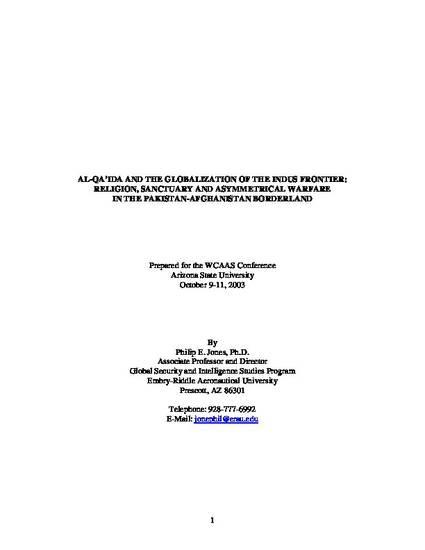
Presentation
Al-Qai'da and the Globalization of the Indus Frontier: Religion, Sanctuary and Asymmetrical Warfare in the Pakistan-Afghanistan Borderland
Western Conference of the Association of Asian Studies (WCAAS)
(2003)
Abstract
"Usama bin-Laden’s use of the Pakistan-Afghanistan borderland as a protected sanctuary and staging area for political-military operations reproduces at a global level the historic use of the northwest frontier by Muslim religious-political groups to wage war against non-Muslim powers, whether regional or imperial. This paper posits that, beginning with the jihad of Sayyid Ahmad Shaheed (d. 1831), mounted between 1826 and 1831 in the Vales of Peshawar and Hazara against Sikh rule, there is a relatively unbroken tradition within Indic Sunni Islam of radical, and often violent, opposition to rule by non-Muslims in what were regarded as Muslim lands. Even when the orthodox Sunni establishment had drawn inward, as after the Great Rebellion of 1857, there were elements with of intractable opposition to British rule who consistently showed an ambition to restore Muslim rule by engaging in intrigues with Afghans, Persians, Turks, Germans, Russians, and, indeed, Soviet Communists. By establishing his protected base area in this region, bin-Laden is the most recent beneficiary of a long tradition.
The rugged physical structure of the region, the delight in war of its Pakhtun peoples, and its strategic role in the ‘Great Game’ have made the borderland historically attractive to numerous raiders, military adventurers, empire builders, and religious revolutionaries. Bin-Laden, the latest of the latter, has made his mark by adapting a regional sanctuary to support a ‘global jihad’ against the growing imperial pretensions of the United States. Al-Qa’ida has made effective, even brilliant, use of its opportunities in this volatile region, including the military lessons leaned in the anti-Soviet Jihad of the 1980s, a capacity to use globally networked technologies and adherents, an acute understanding of the predilection of the Pakhtuns to religious appeals, and the unprecedented rise to rulership of the Sunni clergy in Afghanistan and now in Pakistan’s western border provinces. In essence, the Pakistan-Afghanistan borderland has become—and at least partially remains—the main base area for an evolving ‘Sunni Revolution’ in the world’s most unstable region, an arc of crisis extending from Kashmir in the east to Chechnya in the west."--Summary
Keywords
- Pakistan,
- Afghanistan,
- Al-Qa'ida,
- Globalization,
- Warfare and Religion
Disciplines
Publication Date
October 10, 2003
Location
Arizona State University
Citation Information
Philip E. Jones. "Al-Qai'da and the Globalization of the Indus Frontier: Religion, Sanctuary and Asymmetrical Warfare in the Pakistan-Afghanistan Borderland" Western Conference of the Association of Asian Studies (WCAAS) (2003) Available at: http://works.bepress.com/philip-jones/4/
